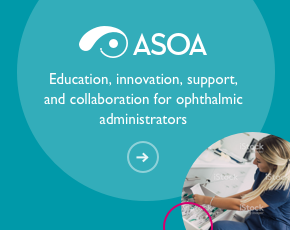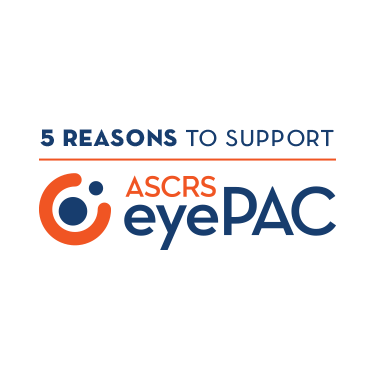CY2026 AMBULATORY SURGERY CENTER (ASC) PAYMENT SYSTEM AND QUALITY REPORTING (ASCQR) PROGRAM
PROPOSED RULE RELEASED
2026 ASC Conversion Factor Projected at $56.207 for
ASCs Meeting Quality Reporting Requirements
Today, the Centers for Medicare & Medicaid Services (CMS) issued the Calendar Year (CY) 2026 Hospital Outpatient Prospective Payment System (OPPS) and Ambulatory Surgical Center (ASC) Payment System Policy Changes and Payment Rates proposed rule, along with an accompanying fact sheet. The rule has a 60-day comment period, and ASCRS will be providing comments.
ASC Conversion Factor
For CY 2026, CMS proposes to adjust the CY 2025 ASC conversion factor ($54.895) by the proposed wage index budget neutrality factor of 0.9999 in addition to the proposed productivity-adjusted hospital market basket update of 2.4%, which results in a proposed CY 2026 ASC conversion factor of $56.207 for ASCs meeting the quality reporting requirements.
For ASCs not meeting the quality reporting requirements, CMS is proposing to adjust the CY 2025 ASC conversion factor ($53.828) by the proposed wage index budget neutrality factor of 0.9999 in addition to the quality reporting/productivity-adjusted hospital market basket update of 0.4%, which results in a proposed CY 2026 ASC conversion factor of $55.109 for ASCs not meeting the quality reporting requirements.
ASC Market Basket Update
For CY26, CMS is proposing to extend utilization of the hospital market basket update as the update factor for the ASC payment system for one additional year, through CY 2026, while CMS continues to study the migration of outpatient surgical procedures.
Estimated Impact of Proposed CY 2026 Update to ASC Payment System on Aggregate Payment for Cataract Surgery (66984)
Table 114 shows the estimated impact of the updates to the revised ASC payment system on aggregate ASC payments for selected surgical procedures, including 66984, for CY 2026. The proposed ASC payment rate for cataract surgery, CPT 66984, is estimated to decrease by 5% of the CY25 payment rate of $1,371. Overall, CMS is proposing a 2% decrease in eye surgical procedure payments. The decrease is due to relative decline in the OPPS relative weights for the Level 1 Intraocular Procedures APC which is attributable to the relative decline in hospital geometric mean costs for procedures assigned to this APC. Refer to Table 113 for impacts on surgical specialty.
Non-Opioid Treatments for Pain Relief to be Paid Separately in Both the ASC and HOPD Settings
Previously, CMS finalized a policy that non-opioid pain management drugs or biologicals that function as a supply in a surgical procedure are eligible for separate payment if the drug or biological does not have transitional pass-through payment status and is not already separately payable in the OPPS or ASC payment system. CMS will continue this policy for CY 2026. As a result, Omidria (J1097) and Dextenza (J1096) will continue to receive separate payments in the ASC and HOPD settings. CMS proposes to continue to implement statutory payment limitations under which the additional payment may not exceed an estimated 18% of the OPPS payment for OPPS service or group of services with which the non-opioid treatment is provided.
Under these provisions, CMS is proposing five drugs and six devices to qualify as non-opioid treatments for pain relief. These products are to be paid separately in both the HOPD and ASC settings for CY 2026, including Omidria (J1097) and Dextenza (J1096). Proposed payment limitations for these two drugs are:
- Omidria (J1097) payment limitation: $414.05
- Dextenza (J1096) payment limitation: $419.57
Refer to Table 83 in the rule.
ASC Quality Reporting (ASCQR) Program
The ASCQR Program is a pay-for-reporting quality program for the ASC setting. The ASCQR Program requires ASCs to meet program requirements or receive a reduction in their annual fee schedule update.
CMS is not proposing any changes to the Cataracts: Improvement in Patient's Visual Function within 90 Days Following Cataract Surgery (ASC-11) measure, which will remain voluntary in 2026. ASCRS strongly opposes the inclusion of this measure and will continue to work to ensure that the reporting does not become mandatory in the future.
Measure Removal Proposals
CMS is proposing to remove the following measures beginning with the indicated ASCQR performance years:
Beginning with the 2024 Reporting Period/2026 Payment Determination:
- COVID–19 Vaccination Coverage Among Health Care Personnel (HCP)
Beginning with the 2025 Reporting Period/2027 Payment Determination:
- Facility Commitment to Health Equity (FCHE)
- Screening for Social Drivers of Health (SDOH)
- Screen Positive Rate for SDOH
For the removal rationale, CMS cites removal Factor 8: the costs associated with achieving a high score on the measure outweighing the benefit of its continued use in the program.
New Measure Proposal
CMS is proposing to add one new ASCQR measure: Patient Understanding of Key Information Related to Recovery After a Facility-Based Outpatient Procedure or Surgery, Patient Reported Outcome-Based Performance Measure (Information Transfer PRO–PM).
This measure would evaluate patient understanding of provided discharge information for patients aged 18 years or older who had a procedure (surgical or non-surgical) at an ASC via a 9-item survey.* If finalized, ASCs would have the option of either distributing the survey and collecting the data themselves or through their authorized third-party vendor. CMS proposes to require the survey be distributed 2–7 days after post-op through either e-mail or text. Patients would have a 65-day window to respond.
The proposed new measure would be voluntary for 2027–2028, and mandatory beginning with the 2029 reporting period. CMS proposes to use the HQR system for submission of this measure.
*A copy of the survey is available on page 20 of this pdf.
Extraordinary Circumstance Exception (ECE)
CMS proposes to update the ASCQR ECE policy to clarify that CMS has the discretion to grant an extension in response to an ECE request. In addition, CMS may grant an ECE to one or more facilities that have not requested an ECE if CMS determines that:
- A systemic problem with a CMS data collection system directly impacted the ability of the facility to comply with a quality data reporting requirement, or
- That an extraordinary circumstance has affected an entire region or locale.
Request for Information on Measure Concepts under Consideration for Future Years: Well-Being and Nutrition
CMS is seeking input on well-being and nutrition measures for consideration in future rulemaking. Specific areas of interest to CMS include:
- Tools and measures that assess overall health, happiness, and satisfaction in life, which could include aspects of emotional well-being, social connections, purpose, and fulfillment.
- The applicability of tools and constructs that assess the integration of complementary and integrative health, skill building, and self-care.
- Tools and measures that assess optimal nutrition and preventive care.
- CMS outlines that assessments for nutritional status may include strategies, guidelines, and practices that promote healthy eating habits and ensure individuals receive the necessary nutrients for maintaining health, growth, and overall well-being.
- CMS also notes that such assessments may also include aspects of health that support or mediate nutritional status, such as physical activity and sleep.
Additional Details to Come
ASCRS is reviewing the 913-page proposed rule, and additional information will be detailed in upcoming editions of Washington Watch Weekly.



